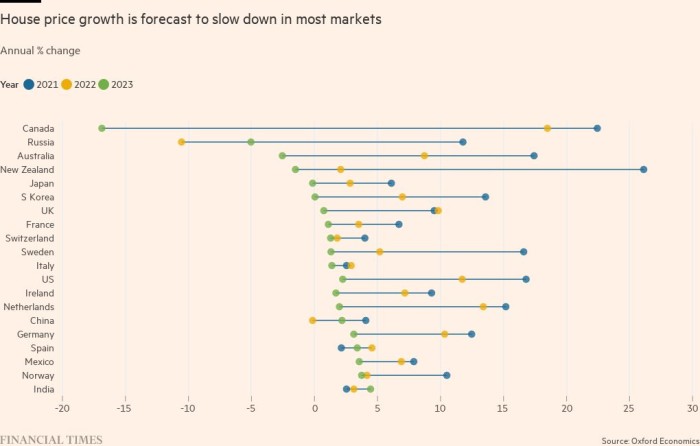Anne Bate felt “crazy” trying to downsize in the middle of a global pandemic. But selling her home in the paradise of the Pahi fishing village in the north-west of New Zealand’s North Island proved the easy part.
It was in Timaru, her destination some 1,360km away on South Island, that Bate experienced the other side of the market. “It was like the quick and the dead,” she said. Even as a cash buyer she said it was a “miracle” that she managed to find a place and move closer to her grandchildren.
New Zealand has been in the throes of one of the biggest property booms in the world. A relative safe haven, with comparatively low cases of Covid-19, the median house price has surged by 43 per cent over the past two years, according to Sense Partners, an economics consultancy.
That has left buying a home beyond the grasp of many Kiwis. With the median house price now ten times the median annual income, the government and the central bank have struggled to find ways to cool the market without triggering a crash.
The country is an extreme example of what’s happened to housing markets during the pandemic. Prices have surged from Canada to Australia since the first quarter of 2020, when policymakers launched a fiscal and monetary stimulus. Wage growth, meanwhile, has been more modest.

Now, as inflation takes hold across the globe, buyers and sellers are waiting to see what the removal of central banks’ and governments’ stimulus and a series of rates rises will do to the housing market, and the wider economy.
The Reserve Bank of New Zealand began tightening monetary policy last October, after an 18-month spell during which its benchmark cash rate was just 0.25 per cent. The rate has been sharply increased to 2 per cent and is seen hitting 4 per cent within a year as the bank tries to chase inflation — now at almost 7 per cent — out of the system.
“To some degree, New Zealand is a canary in the coal mine,” said Kelvin Davidson, chief property economist at CoreLogic in Wellington. “It’s a test case for a central bank to push up rates as house prices are soaring to deal with inflation.”
Its capacity to keep Covid-19 in check for much of the pandemic led to less of a downturn in New Zealand than other economies. Relatively strong growth — and a change in monetary policymakers’ mandate so that they must counteract any risk that house prices pose to financial stability — meant the central bank was among the first to act on signs the economy is overheating.

The impact of those rises, which have been accompanied by tighter lending conditions such as narrowing the amount of high-risk mortgages with steep loan-to-value ratios, are being keenly felt in the housing market.
Estate agent Barfoot & Thompson think the volume of sales will fall to around 60 per cent of the levels seen last year. “House prices in New Zealand are tumbling and all signs point to a further deterioration in the months ahead,” said Ben Udy, of Capital Economics. He now expects the peak-to-trough decline in house prices to hit 20 per cent, double his previous prediction.
But even a 20 per cent decline would only take house prices back to 2020 levels. The real risk to the New Zealand economy is that households slash spending dramatically to protect the wealth that the housing boom and low rates helped create.
Shamubeel Eaqub, an economist with Wellington-based Sense Partners, has calculated that housing wealth has increased by NZ$460bn, or $295bn, during the pandemic. New Zealand’s gross domestic product in 2021 was NZ$350bn.
New Zealand is a particular example of an economy where “consumers are more sensitive to house prices than they are in other places”, said Udy.
With central banks now raising rates across the globe — and expected to tighten further over the coming months — a big question is whether other markets will follow New Zealand down.
Estate agents remain optimistic. “While markets will slow, I don’t think we’re going to see price falls globally. The rate of price growth will just dip and soften over the course of the next few months,” said Kate Everett-Allen, partner and head of international residential research at Knight Frank.
Economists are more sceptical. Innes McFee, chief global economist at Oxford Economics, saw a period of “very weak price growth” ahead, as higher rates raised mortgage costs. Vicky Redwood, a senior economic adviser at Capital Economics, thinks prices will fall in the UK, Australia, Canada, Sweden and Norway, along with New Zealand.
Some New Zealanders see a silver lining from the bursting of a housing bubble that has left many struggling to get on to the property ladder. House ownership is at its lowest level since the 1950s, according to Eaqub. He noted that around 4 per cent of New Zealand’s tax revenue is spent on housing assistance.
Tobias Otting, a 29-year-old consultant with CoreLogic who is looking to buy a house in Wellington with his partner, has witnessed a stand-off between sellers trying to hold prices firm and buyers looking to price in the impending dip. “Reality is setting in. It’s a buyer’s market now,” Otting said. “We have the luxury of being patient.”



